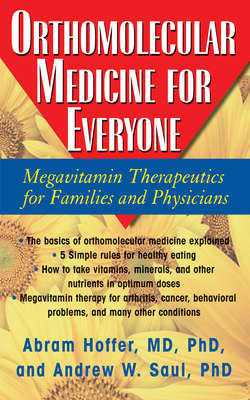Читать книгу Orthomolecular Medicine for Everyone - Abram Hoffer M.D. Ph.D. - Страница 22
На сайте Литреса книга снята с продажи.
THE SUGAR METABOLIC SYNDROME
ОглавлениеSurgeon-Captain T. L. Cleave, M.R.C.P., argued that much disease results from an enormous increase in the consumption of refined or processed foods, especially sugar and white flour. The natural carbohydrates, such as whole-grain cereals, are not harmful but rather they are very essential. Cleave had considered using the term “refined carbohydrate disease.” This syndrome, by any name, is defined as a single root cause of disease that afflicts many different organs, including the brain.
White bread has been used for several thousand years, but it did not become cheap enough for general consumption until about the end of the eighteenth century. In terms of evolution and adaptation, we have had only a moment in a very long history in which to develop any biological adaptation. In Britain in 1815, about 15 pounds of sugar were consumed per person per year—today, it is close to 125 pounds. The total amount consumed is still rising. There have been two interruptions in this trend. During World War I (1914 to 1918), sugar consumption dropped to about 65 pounds, as it did again during World War II (1939 to 1945). This was due to the blockade that prevented shipments of sugar from overseas. In England during the wars, there was a significant improvement in the general health of the nation, something that was very surprising and perhaps even disappointing to the psychosomatic theorists who had predicted that the increased psychosocial stress of the war would increase the incidence of the so-called psychosomatic diseases. But after the wars, the consumption of sugar rose rapidly until it reached its present level. There is no reason to suspect that the consumption has reached its maximum, since the massive intake of sugar produces a form of addiction that drives the intake up and up. This phenomenon has been specific for the industrial nations, but the drive to export has expanded it to the entire globe. Just as bad money drives out good money, so does bad (sweetened) food drive out good food. Many nations who can ill afford to do so are importing increasing quantities of high-sugar–content foods and decreasing their intake of nutritious natural foods.
If you enjoy Mexican food, you know that a traditional breakfast consists of a corn tortilla covered by two fried eggs, with a side order of beans. It is a very inexpensive, filling, and satisfying meal that will keep you from being hungry until evening. We have also observed the ordering habits of the Mexicans in similar restaurants, frequently selecting an American breakfast consisting of pancakes (white flour) covered with syrup, white toast covered with jam, and coffee containing ample quantities of sugar. A Mexican public health official, speaking at a medical meeting, lamented that up to 40 percent of the tested population of Mexico were prediabetic (probably hypoglycemic). It was obvious that the American food was considered more nutritious and valuable since it cost twice as much. It certainly was twice as sweet.
We live in an industrialized culture permeated and saturated with sugar. For an excellent analysis of the toxic effects of sugar, see the book Sweet and Dangerous by John Yudkin, M.D., Ph.D., professor emeritus at Queen Elizabeth College, London. Professor Yudkin recommends that it be banned, and anyone who reads his work carefully must agree, even though it seems almost impossible for this to happen. However, if we were to decrease our consumption to about half of what it is today—to about the level forced upon England by the two wars— there is little doubt that there would be a major improvement in our national health.
As with refined flour, there has been no time to adapt to this newer diet. We do not see how one could ever adapt, unless a few humans develop a gastrointestinal system and bacterial flora that will be able to synthesize vitamins, protein, and fat from the sugar. But this system could not make the minerals that are required. Even if such a development were possible, it would require many hundreds of thousands of years. During this time, the toll on human life and the degree of disease will have been enormous. We do not think we should wait for nature; we should instead use our intelligence and our knowledge of nutrition. By simply reverting to the type of food to which we have been adapted, we can immediately begin to save humanity from a very large fraction of the diseases it will otherwise continue to suffer.
